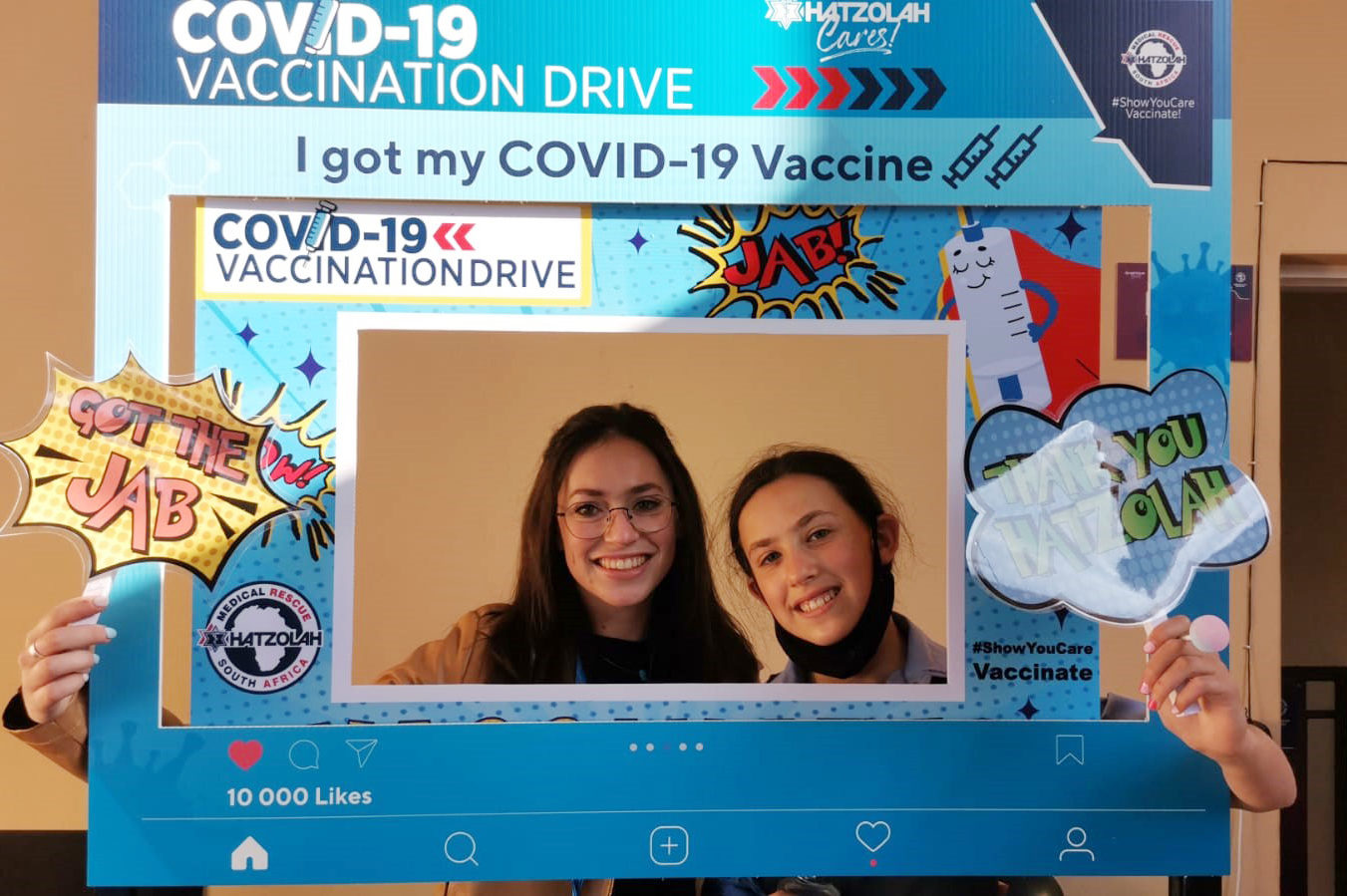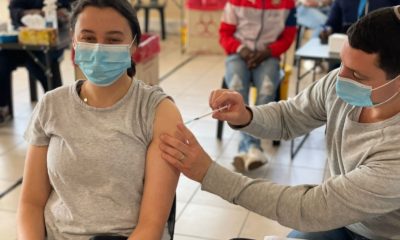
Banner

Teen vaccinate, or not teen vaccinate? Not a question, say doctors
Published
3 years agoon
As the news broke that South Africa would allow children aged 12 and up to get vaccinated with a first Pfizer shot, some parents were thrilled but others expressed fear, uncertainty, even anger.
“As the daughter of a polio survivor and the mother of an asthmatic child, I feel strongly that we need to get vaccinated, not just for ourselves, but for others,” says Vanessa Levenstein, a copywriter at Fine Music Radio in Cape Town. “My son, Sammy, is 14 and my daughter, Safra, is 17, and this past Shabbat, we all said how grateful we were that the vaccine was now available to them. I feel we are privileged to have it.”
Her husband, Jonathan Musikanth, an attorney, agrees. “We look forward to giving our children some sort of normality again,” he says. Levenstein adds, “We’re living in a society with huge social inequalities: someone living in a crowded Manenberg flat cannot self-isolate if they get infected. The only way to stop the spread is through the vaccine roll-out. ‘If I’m not for myself, who will be for me? And being only for myself, what am I?’ The words of Hillel still ring true.’”
The SA Jewish Report asked parents on Facebook what they thought, and a mother responded, “The judgement and anger towards people who don’t want to be vaccinated is extreme and frightening.” For this reason, she asked to be quoted anonymously.
“My children are healthy and have been exposed to COVID-19 and didn’t have any symptoms,” she said. “I don’t feel that I need to vaccinate them against something that I feel isn’t dangerous to them. They didn’t have any symptoms, so I don’t feel I need to protect them from dying. The fact is that nobody in the world knows the long-term effects of this vaccine. I’m not willing to risk it.
“It’s all well and good saying we should do it for herd immunity, but I won’t allow my children to get vaccinated to protect others when they don’t need the protection themselves,” she said. “Also, I don’t feel that 12 year olds are old enough to make a decision about this. My kids would agree.”
Asked how she felt about her children navigating a post-COVID-19 world unvaccinated, she said it was “a huge concern”.
“I’m concerned that their freedom will be taken away because of this. However, is that a good enough reason to go against what I wholeheartedly believe to be the truth about the vaccine?” she asked. “I don’t believe that by not vaccinating kids, I’m putting anyone else’s life in danger.”
Johannesburg pulmonologist and parent Dr Anton Meyberg told the SA Jewish Report, “This is definitely a scary and emotive time in our lives as parents. It’s one thing to vaccinate ourselves, the adults, but now we are being asked to trust science with our own children. Whereas we know that children definitely don’t get as sick as adults, they definitely can still get sick [from COVID-19]. And some get severe multisystem inflammatory syndrome while others can suffer from ‘long COVID’.
“There are so many myths and misconceptions about vaccination and they need to be dispelled,” he says. “As a doctor on the frontline, it’s a ‘no brainer’ to me that my daughter and children over the age of 12 should be vaccinated. As parents, we have the responsibility of safekeeping and caring for our children, and vaccinating them allows us to do this. No doubt by vaccinating our teens, we’re protecting their parents and grandparents, but we’re also making sure that schools can remain open and our children can lead almost normal lives.
“The most documented side effect in children after the second dose of the Pfizer vaccine, mainly in boys 16 to 30 years of age, is myocarditis [inflammation of the heart muscle],” Meyberg says. “Males aged 12 to 17 are more likely to develop myocarditis within three months of catching COVID-19 at a rate of 450 per million infections. This compares with 67 per million after the vaccine. The condition is self-limiting and easily treatable, and it’s crucial to avoid exercise for up to a week post vaccination in order to decrease the chances of its occurrence. Widespread vaccination is a critical tool to help stop this pandemic. The question shouldn’t be if you’ll vaccinate, but rather when.”
Jeffrey Dorfman, associate professor in medical virology at Stellenbosch University, says “the arguments for vaccinating children are very strong in countries such as South Africa and the United States where there’s still a lot of COVID-19 transmission and the potential for more waves. Children may be at lower risk of severe COVID-19 disease than adults, but not zero. In the United States, more than 63 000 children have been hospitalised since August 2020, and more than 500 have died. More than 4 000 have been diagnosed with multisystem inflammatory syndrome, which is dangerous.
“Additionally, the vaccines in use prevent many COVID-19 infections – not 100%, as we all know about breakthrough infections, but even for the Delta variant, vaccination prevents about 70% of infections based upon current studies,” he says. “That’s enough to matter to the people around children who are vaccinated, and may be enough to stop or reduce school outbreaks. Vaccination will certainly reduce the risk of a child bringing a COVID-19 infection home to vulnerable adults. It’s certainly not unheard of for children to bring an infection home from school resulting in the death of a caregiver, and this is tragic and preventable.
“Additionally, I know of cases of children who were asymptomatically infected and had to move away from vulnerable grandparents,” he says. “It was scary for the people involved. The children had no symptoms and were tested only because they had a COVID-19 positive contact. Were the contact not known, they would have continued to live with the grandparents, who would have been at risk. Even children who have had COVID-19 can have it again, and a large study from Kentucky in the United States shows that vaccination further reduces the risk of COVID-19 re-infection. We aren’t going to get on top of COVID-19 unless we use the tools at our disposal. As a society, we can’t afford serious lockdowns and have to use less disruptive tools. Vaccines should be high on everyone’s list.”
A third mother expressed mixed feelings about vaccinating her teenage sons. However, after reading a letter by Johannesburg family physician Dr Sheri Fanaroff, she has decided to go ahead with it. In the letter, Fanaroff laid out all the questions and concerns to show that “the risk of getting COVID-19 infection far outweighs the risk of vaccination in teenagers. I can say without hesitation that I will be relieved to have my own teenagers at the front of the queue to get vaccinated this week so that they can return to a more normal lifestyle.”
She explained amongst other points that “vaccination reduces the risk of teenagers dying: the virus was the fourth leading cause of death for those aged 15 to 24 and the sixth leading cause for those aged five to 14”.
Fanaroff also explained that “vaccination reduces the risk of severe infections, hospitalisation, and the need for oxygen and intensive care in teenagers. Recent figures from the US show that the hospitalisation rate among unvaccinated adolescents was ten times higher than that among fully vaccinated adolescents.
“There’s no biological reason or proof that a COVID-19 vaccine can interfere with the progression of puberty. There’s also no biological mechanism whereby hormones associated with puberty can have an impact on immune responses to COVID-19 vaccines. There’s no evidence that the vaccine has any impact on fertility.”
During the health department briefing on Friday, 15 October, acting Director General of Health Dr Nicholas Crisp stated that based on the Children’s Act that allows children aged 12 to 17 to consent to medical treatment, children in this age group don’t require their parents’ consent to have a COVID-19 vaccine. Teens can register and consent to being vaccinated without permission.











Choni Davidowitz
Oct 21, 2021 at 10:52 am
Ivermectin is safer and effective.